Portugal's Love Affair with Traffic Circles
Where Traffic Meets a Little Chaos by Mark Brunell and Steve Sousa
Olá Amigos! (Hello Friends!) ~
Drive through just about any Portuguese town or city and you’ll notice them right away—Portugal loves traffic circles. Here, they’re called rotundas, while in the U.S. they’re often referred to as traffic circles, rotaries or even roundabouts.
Long before roundabouts became a global trend, Portugal was already ahead of the game. By the 1980s and 90s, studies showed these intersections could reduce congestion and accidents. Portugal embraced them, and today there are thousands spread across the country, guiding traffic through bustling cities and sleepy villages alike. In fact, outside the big cities, you can drive through entire towns without hitting a single traffic light—but you’ll likely pass through more than one rotunda.
Why such devotion?
Because roundabouts actually work. They not only help prevent the nasty T-bone collisions so common at stoplight intersections, and the dangers caused by red-light runners, they also reduce exhaust from idling engines. Roundabouts keep traffic flowing with fewer stops and starts, making them a win for efficiency, safety—and even a small nod to cleaner air. All that rolled into one.
Our first real encounter with a Portuguese rotunda was back in 2017, during our very first trip here. Fresh off a long plane flight and already nervous about driving a rental ‘carro’ (car) in a foreign country, we found ourselves tackling what was probably one of the largest and busiest rotundas in Portugal—the one outside the ‘Lisboa’ (Lisbon) ‘Aeroporto’ (Airport). I’ll be honest, we ended up doing more than one full loop just to spot our exit, then another to figure out how to reach it. We learned quickly that navigating roundabouts takes a bit of nerve—and plenty of practice—especially in Portugal.
Drivers here can be a little aggressive; many aren’t big on stopping, and yielding is more of a suggestion than a rule. We have to keep a sharp eye as we loop around to our exit. And if you’ve ever gone around one more time just to figure it out—you’re definitely not alone.
Locals handle rotundas with ease—no hesitation, just a quick signal and a smooth glide through the circle. Meanwhile, tourists (and new expats) hover nervously at the yield line, hearts racing as they enter and loop around carefully to their ‘saida’ (exit).
Our town doesn’t have a single traffic light—just rotundas, and plenty of them. Over time, we’ve come to appreciate them, preferring their smooth flow and laid-back feel to traditional intersections.
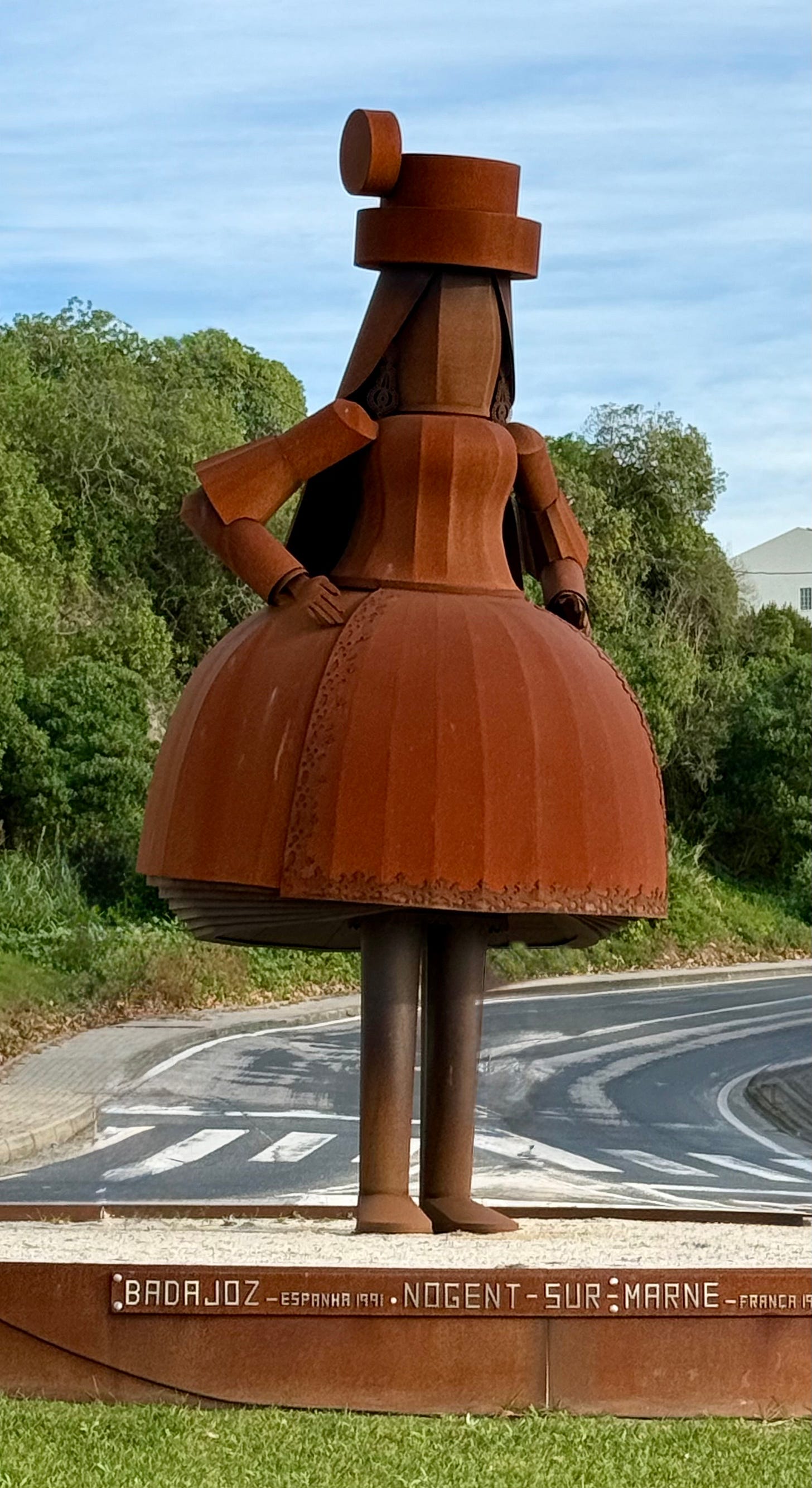


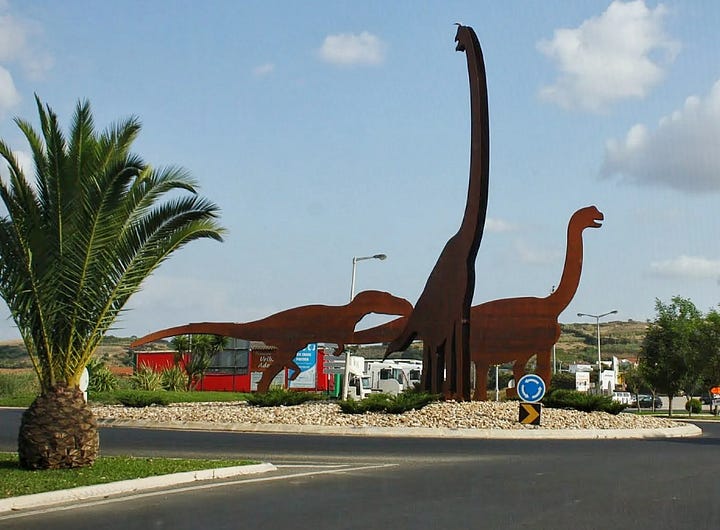
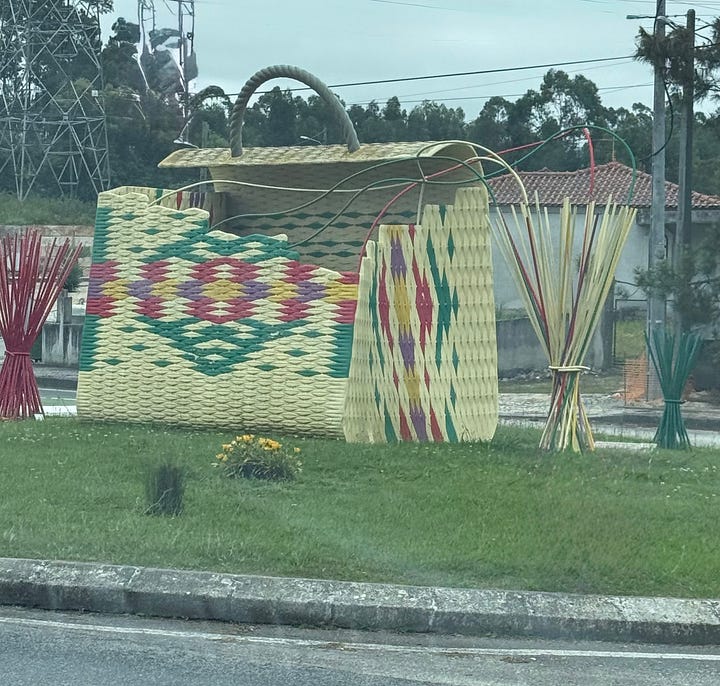




In Portugal, rotundas are everywhere. And true to Portuguese style, they’re not just practical—they’re full of character. Each town adds its own flair, with rotunda centers featuring everything from minimalist designs to fountains, metal sculptures, and even a giant wicker basket. Take the Algarve, for example, where rotundas proudly celebrate the region’s maritime heritage with sailboats and anchors.
One of the rotundas in our town features a large metal sculpture of a Nazarene woman proudly dressed in her iconic seven skirts.
They’re more than just traffic tools—they’re fun snapshots of local identity, woven into the heart of Portugal’s towns and daily ‘vida’ (life). Practical yet charming, these circular junctions keep traffic flowing with style, while turning even the simplest routine into something worth circling back for.
Até á próxima, tchau! (Until next time, bye!)
13
Everything Else In Between:
Store Hours = Come Back Yesterday. Is it open? Maybe. Closed for lunch? Possibly. Hours posted on the door are more like suggestions. No sign on the door? That's a sign you're left hanging. Sometimes, the only way to find out is to try the door handle and see what happens. It's all part of getting used to embracing the unknown!
The All-Purpose Word—“Pois”. The word “pois” can mean “yes”, “maybe”, “oh right”, “I understand”, or “I hear you”. It’s all in the tone. Over time, I’ve learned to accept “pois” as Portugal's answer to nearly all of life’s questions.
Shopping Cart Strategy. In most Portuguese stores, shopping carts are chained together and can only be freed with a coin—a clever system that keeps them from rolling into parked cars or wandering off the property with shoppers. You’ll need to remember to bring a €1 coin to unlock your shopping cart. Show up without one, though, and you’ll either find yourself roaming the lot for a stray cart someone forgot to lock or juggling groceries awkwardly through the store. Once you unload your bags into your car, and return your cart, you’ll get your coin back. Some stores offer small rolling baskets that don’t require a coin, but they’re strictly for indoor use—not allowed outside or past the checkout. A friendly clerk has reminded me more than once: rolling baskets stay at the register.
Say It Like a Local:
carro = car
Lisboa = Lisbon
aeroporto = airport
saida = exit
vida = life
Editor’s note (aka me): My overconfident fingers occasionally go rogue. In my last post, I botched the spelling of the Portuguese word for ‘jar’. The correct Portuguese word for ‘jar’ is ‘garrafa’—not whatever jumbled word my fat fingers managed to invent.
Stay tuned—we look forward to sharing more of our adventures in Portugal with you! Is there a topic you’d like us to share? Please feel free to comment, ask questions, or share your thoughts and feedback with us.
Settling into life in Portugal and navigating a new culture feels like being a 'fish out of water'. Inspired by this metaphor, we embraced Portugal’s cobblestone streets and iconic sardines, naming our blog—'Two Sardines on Cobblestone’.

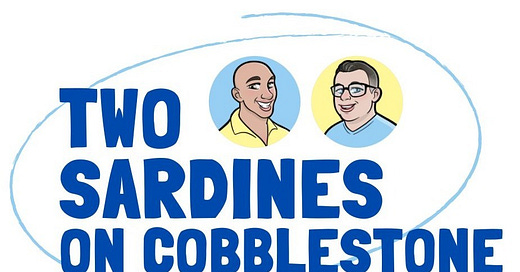


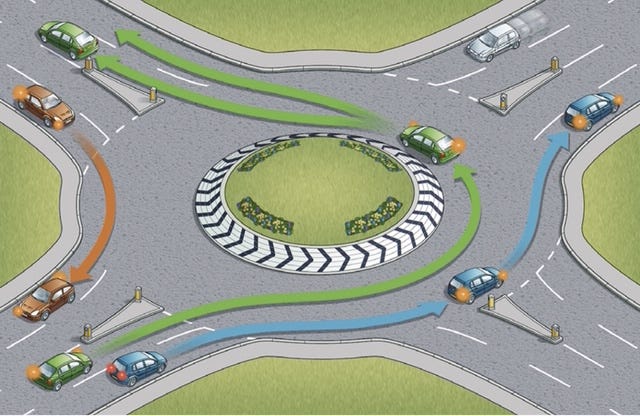

Very interesting. Thanks for sharing
We encountered roundabouts in Quebec (outside of Montreal) and 1 time out of 2, we missed our exit 😆